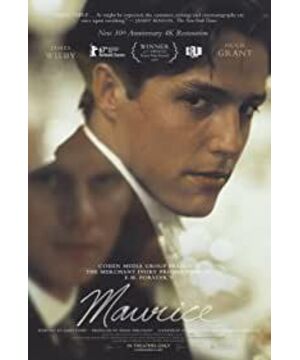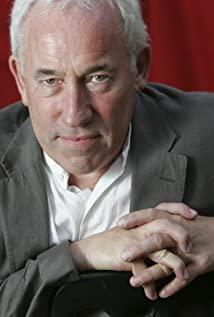The original title only had the word Maurice, and after adding the word "lover", it became more charming. However, there is no gimmick for fun here, and there is no homosexuality above the opposite sex. It just tells about Morris's love and even his life story.
The framing of the movie is beautiful, like an oil painting. In the first half of Cambridge, the main line is left aside, and the atmosphere can also be infected. Higher education institutions and students can play a song and float the boat lightly.
Morris met Clive here, and his love was secret and he didn't dare to break it. There are naturally social reasons for this cautiousness, but the classical haziness is far more beautiful and longer than the indulgence of love. As for the handshake on the lawn, and the train farewell later, they are all subtle but long-lasting pictures.
Morris is fully committed once he accepts it, and Clive, whether sincere or not, is gradually avoiding it. In fact, at the beginning, he was the one with a clear-cut stand, despising going to church and despising teachers who avoided talking about Greek history. But all this may just be the rebellion in his heart. In reality, he will still pray before meals, and will finally choose a career and marriage. Clive also justified his relationship with Morris because women couldn't relate to his soul and mind.
And Morris is Morris, of course, there are many factors (for example, from the play, his family atmosphere seems to be much warmer than Clive's).
Everyone has their own aspirations, and there is nothing wrong with them. After all, although the first love is beautiful, it will become the past when it ends. Even if Clive is self-motivated and happy that Morris "falls in love with a girl", there is no need to be blamed. But what's hard to accept is that he doesn't understand Morris's pain (can't forget Morris in hypnosis and can't explain why he likes to cry with short hair), and he wants Morris to be his friend, to be out of politics and his wife. Make friends who meet for five minutes and be the eighth friend.
At this time, Alek appeared. Although he appeared a little late, he came just in time. Morris, who was a student, accepted the confession through the twists and turns of the "Symposium". If he met Alek at that time, he would be scared away. But after being completely hurt by Clive, Alek's straightforwardness and enthusiasm are so valuable: "I won't ask you for a penny, I won't hurt you a finger." He has no education, But the words follow the heart. Presumably for Morris at this time, life can no longer be only poetry and distance. This kind of rampant confession and unreserved dedication are even more touching.
Maurice and Alek are both very simple people. Even if Maurice is unhappy, he will be happy for his sister to gain true love and stay together; Alec is more like a child, and will also be angry when he is angry. Intrigued by what's in the museum. In the end, they both abandoned the world and chose love. Needless to say, of Morris's class, Alek actually gave up the opportunity to change his living conditions in Argentina.
Near the end of the play, Morris has completely come out of the hesitation, "I will tell you everything before, and I will not say a word after everything", these powerful words are unbearably firm. The place where my heart is at ease is my hometown.
PS: There are few people like Maurice and Alek, and the green forest where they live is also the author's utopia. It is also a fictional character, reminiscent of Aso-kun, who brought Aya comfort from a liter of tears. The beautiful hope has replaced the imperfection of reality, and it is also showing the charm of creation.
View more about Maurice reviews











